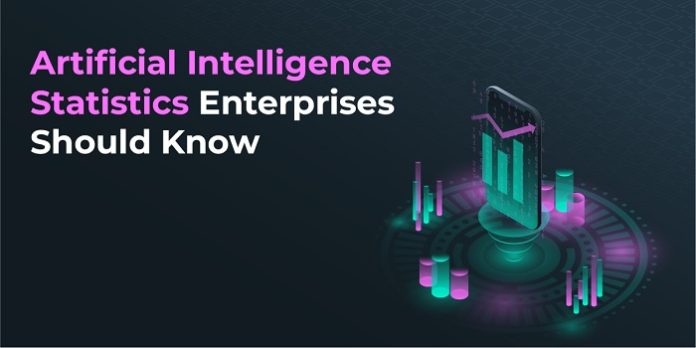Artificial Intelligence and AI-based products have taken over the current digital transformation. What initially served the purpose of automating processes is now optimizing most business operations with contemporary tools and technologies.
As per the Artificial Intelligence statistics, the AI market is expected to grow by a CAGR of 38.1% between 2021 – 2030. What is fascinating is AI’s initial function was to automate rule-based tasks and do the heavy lifting in the factories to quicken the production process.
The current Artificial Intelligence trends talk about AI’s impact on numerous companies across multiple industries. With Machine Learning, Natural Language Processing, and other modern tools, Artificial Intelligence is slowly becoming an integral part of business processes.
To help you better understand AI’s impact and its scope, we have compiled some industry-based and general statistics in the following sections:
Current AI Trends and Their Future Impact
AI is a rapidly expanding field, and that can be seen through the Artificial Intelligence statistics mentioned below:
- The present worth of AI is worth $328.34 Billion globally.
- About 97 million new jobs will be created by 2025 through AI.
- In the US itself, the AI market is going to reach $299.54 Billion by 2026.
- The global GDP growth is expected to be $15.7 Trillion by 2030 because of AI adoption.
- By the next seven years, AI’s value is going to witness a 13-times increase.
The current Artificial Intelligence trends define its scope in the future across all industries and areas of life. The present-day implementations and needs set the foundation for AI’s growth. Here are a few statistics to help you get a better idea of AI’s future scope in the market.
- By 2030, AI will become an important part of sustained economic growth due to its transformative capabilities, thereby increasing AI’s value from $136 Billion to $1811.8 Billion globally.
- Approximately 87% of MNCs affirm that integrating AI tools can be highly beneficial to get an advantage in the competitive landscape.
- According to Artificial Intelligence statistics, AI will have a huge share of 26.1% of China’s GDP by 2030.
- By 2030, the two main contributors to the world’s technological advancement would be North America (with approximately 14.5%) and the United Arab Emirates (with about 13.5%).
- According to a PwC publication, AI is expected to assist the Middle East’s economy and have an impact of over US$320 billion by 2030.
AI Solutions Catered to a Particular Industry
The growth in AI has paved the way for custom software development, useful data insight generation for improved decision-making, and many such smart digital solutions. AI-based products are now designed to cater to specific industry-based requirements.
These AI services have taken the shape of diverse digital solutions in the form of automation, organization, and management tools. From providing quick customer services to expanding the client base with automated emails and newsletters, AI has optimized the current business landscape.
Let us look at a few industry-specific Artificial Intelligence statistics that will further solidify our claims.
- The financial services organizations will be investing about $11 Billion to integrate AI-driven solutions into their system to make it more customer-friendly and secure.
- As per WHO, by 2030, AI-powered healthcare solutions will be incorporated to automate 10% of the tasks and mitigate the issue of staff shortage in the industry.
- Artificial Intelligence-based data insights have helped manufacturers plan investments and production of particular goods and reduce prediction errors by 20%.
- Amazon reduced the click-to-ship time from 60 – 75 minutes to 15 minutes after acquiring the robotics startup to automate order management, packing, and shipment in the warehouse.
- According to Forrester, AI will automate 16% of jobs while creating about 9% of employment opportunities thereby creating a net loss of 7% of jobs in the US alone by 2025.
The evolving Artificial Intelligence trends will impact the healthcare, customer service, and finance sectors the most. AI has already started disrupting these industries in the form of personalized medicine, AI-powered chatbots, and better data management.
In the future, Healthcare might witness various AI-powered solutions for better data collection, implementing the practice of predictive healthcare and remote healthcare services in case of emergencies.
Customer services, at present, use AI chatbots to manage and resolve general customer queries. With more efficient solutions, this industry might get completely automated, thus reducing customer wait time and making the process more effective.
The finance sector will benefit the most as more advanced AI solutions roll out. This industry has maximum paperwork which requires a lot of manual labor. AI can simplify document keeping, organizing, and managing. To elevate its scope, AI can also be used for data mining to understand customer’s requirements and improve customer retention with personalized services.
Some of the Latest Artificial Intelligence Statistics
Business owners across the world understand the importance of current digital integrations for success. It helps them interact with a larger audience, improve brand visibility, and upscale business without much hassle.
This is why numerous businesses are integrating modern AI-powered solutions, and these statistics depict that:
- According to a study conducted by Accenture, businesses will be able to increase their operational efficiency by 40% by integrating AI tools. This will double the economic growth rates by 2035.
- About 77% of people use AI-based technology, while only 33% believe or know about them using it. As much as it is fascinating, it shows the lack of awareness regarding AI and the latest digital transformation trends.
- 84% of big enterprises believe that AI implementation will help them maintain relevancy and gain a competitive advantage.
- According to a Salesforce survey, about 23% of customer service organizations are using AI chatbots to provide a better customer experience.
- AI integration, when done right, can augment business operations. About 65% of consumers find companies with AI tools more reliable.
The current Artificial Intelligence statistics show that the graph of AI’s growth and integration is going to witness a steady upward movement in the near future, but what does this indicate for businesses, their processes, and the digital landscape in the coming years?
Let us have a look at it in the next section.
Future of Artificial Intelligence
Artificial Intelligence is certainly a technology that is going to make business processes more efficient but incorporating it is a complex task. It requires thorough research, planning, and the right approach to make sure that all the digital integrations are exactly what you require for your business growth.
While many are looking forward to what AI has to offer, there are some professionals who are worried about the fact that AI might end up automating almost all business processes. This might lead to many losing their job.
Also read: How to Hire a Node.JS Programmer: The Ultimate Guide
However, as per the current Artificial Intelligence statistics, while AI might automate the present jobs, it will also create many other new job opportunities that may or may not exist today. Rest assured, no matter how advanced it may get, in the end, it is a technology developed to assist humans.
At present, whether it is IT-based or not, all businesses are investing in AI services. They either hire AI developer and enrich their in-house time or hire remote developer for technical assistance while reducing the required investments. This is a positive sign for AI development.
Things to Consider When Investing in AI Tools
Despite all the benefits offered by Artificial Intelligence and its tools, it needs to be integrated in a well-planned manner. There are a few things to keep in mind when investing in AI technologies, one being giving proper training to the employees and second, knowing what will add value to your business.
Having a team of professionals who can easily adapt to the changing system while assisting other talent to get used to the modern system is essential. Integrating these digital tools step by step, keeping the technical expertise of your workforce in mind, will be highly beneficial.
Communicating about what is being implemented in advance will help you and your employees. It will streamline the process, and you will avoid some last-minute confusion as well since everyone will have clear directions regarding the integrations.
Another question to consider is value addition, in the sense that what will I gain from the particular digital integration? Knowing the answers to the question will set clear intentions when investing in smart AI tools. This way, you won’t get swayed by your competitors or the latest Artificial Intelligence trends is crucial. Since digital solutions are no small feat. a clear mindset is necessary.
Conclusion
Present-day Artificial Intelligence statistics are a clear indication of how fast AI is going to grow in the field of technology. Even though many are looking at these digital advancements from the lens of ethics, morality, and its potential negative impact. Currently, it is both an opportunity and a necessity.
There is no doubt that, if implemented in the right manner, it will boost business growth by creating more job opportunities, startups, and advanced business ideas. As of now, it is still a budding concept and can be leveraged by businesses worldwide.


